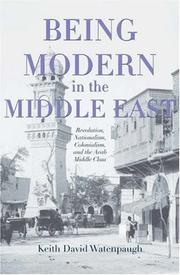| Listing 1 - 2 of 2 |
Sort by
|
Book
ISBN: 9782811118853 2811118853 Year: 2022 Publisher: Tunis: IRMC,
Abstract | Keywords | Export | Availability | Bookmark
 Loading...
Loading...Choose an application
- Reference Manager
- EndNote
- RefWorks (Direct export to RefWorks)
Lié au thème du mouvement national tunisien dans le contexte du protectorat français imposé à la Tunisie, cet ouvrage s'inscrit dans le champ de l'histoire des idées. Il examine la politique orientale menée par les autorités allemandes en situation de rivalité avec les puissances britannique et française et le tropisme en faveur de l'ottomanisme ayant conduit une pléiade d'intellectuels tunisiens à établir des liens avec des représentants allemands, jusqu'à séjourner en Allemagne, de manière plus ou moins durable, au cours du premier conflit mondial. L'ouvrage est consacré à l'exploration des liens entre cinq intellectuels tunisiens exilés, notamment Sàlih a'Sarif at-Timisi, Muhammad al-Hidr Husayn, 'Ali BM tlàmba, Muhammad Bàg 1-yamba et Muhammad 'Ali al-Hâmmi, marqués par la cristallisation de la lutte contre la colonisation et la promotion du panislamisme par les Ottomans. Il montre comment se sont formées des affinités idéologiques et une communauté d'intérêts entre ces penseurs, d'un côté, et des hommes politiques allemands, de l'autre. Évitant la recherche classique des influences, l'auteur opte pour l'étude des interactions entre le parcours individuel et l'histoire globale qui permet également d'éclairer l'actualité. L'étude nous montre, entre autres, comment l'idée du gihôd a été ressuscitée et instrumentalisée par les services secrets allemands, qui ont tenté de soulever les peuples des pays musulmans et comment ces mêmes services secrets ont pu s'appuyer sur le soutien des militants panislamistes et/ou nationalistes. La décolonisation viendra presque quatre décennies plus tard. Ainsi, cet ouvrage touche à un vécu amer et traumatique dont nous vivons encore aujourd'hui les répercussions et les retours du refoulé.
Panislamism --- Ottomanism --- World War, 1914-1918 --- Nationalism --- Germany --- Tunisia

ISBN: 0691155119 1322336342 9780691121699 1400866669 0691121699 Year: 2006
Abstract | Keywords | Export | Availability | Bookmark
 Loading...
Loading...Choose an application
- Reference Manager
- EndNote
- RefWorks (Direct export to RefWorks)
In this innovative book, Keith Watenpaugh connects the question of modernity to the formation of the Arab middle class. The book explores the rise of a middle class of liberal professionals, white-collar employees, journalists, and businessmen during the first decades of the twentieth century in the Arab Middle East and the ways its members created civil society, and new forms of politics, bodies of thought, and styles of engagement with colonialism. Discussions of the middle class have been largely absent from historical writings about the Middle East. Watenpaugh fills this lacuna by drawing on Arab, Ottoman, British, American and French sources and an eclectic body of theoretical literature and shows that within the crucible of the Young Turk Revolution of 1908, World War I, and the advent of late European colonialism, a discrete middle class took shape. It was defined not just by the wealth, professions, possessions, or the levels of education of its members, but also by the way they asserted their modernity. Using the ethnically and religiously diverse middle class of the cosmopolitan city of Aleppo, Syria, as a point of departure, Watenpaugh explores the larger political and social implications of what being modern meant in the non-West in the first half of the twentieth century. Well researched and provocative, Being Modern in the Middle East makes a critical contribution not just to Middle East history, but also to the global study of class, mass violence, ideas, and revolution.
Arab nationalism. --- Civil society --- Middle class --- Revolutions. --- Social conflict --- Arabs --- Nationalism --- Bourgeoisie --- Commons (Social order) --- Middle classes --- Social classes --- Insurrections --- Rebellions --- Revolts --- Revolutionary wars --- History --- Political science --- Political violence --- War --- Government, Resistance to --- Class conflict --- Class struggle --- Conflict, Social --- Social tensions --- Interpersonal conflict --- Social psychology --- Sociology --- Social conditions --- Middle Eastern 1 : --- General & Multiperiod. --- Politics and government --- Middle East --- Politics and government. --- Agriculture (Chinese mythology). --- Al-Jabiri. --- Aleppo. --- Arabs. --- Armenians. --- Armistice. --- Bilad al-Sham. --- Bourgeoisie. --- Bureaucrat. --- Censorship. --- Cilicia. --- Citizenship. --- Civil society. --- Civilization. --- Class conflict. --- Colonialism. --- Communal violence. --- Criticism. --- Disenchantment. --- Eastern Mediterranean. --- Effendi. --- Election. --- Emancipation. --- Emigration. --- Ethnic cleansing. --- Exclusion. --- Fawaz. --- French Colonial. --- French colonial empire. --- Gaziantep. --- Governance. --- Hashemites. --- Hegemony. --- High Commissioner. --- Historicism. --- Historiography. --- Ibrahim Hananu. --- Ideology. --- Imperialism. --- Institution. --- Interwar period. --- Islamism. --- Jews. --- Journalism. --- Kamil. --- Kemalism. --- League of Nations. --- Lecture. --- Legitimacy (political). --- Liberalism. --- Literature. --- Middle East. --- Middle class. --- Military occupation. --- Modernity. --- National identity. --- Nationalism. --- New men. --- Newspaper. --- Of Education. --- Oral history. --- Ottoman Empire. --- Ottomanism. --- Pan-Arabism. --- Political party. --- Political philosophy. --- Political structure. --- Politician. --- Politics. --- Politique. --- Precedent. --- Princeton University Press. --- Public opinion. --- Public sphere. --- Refugee. --- Rhetoric. --- Sectarianism. --- Secularism. --- Separatism. --- Social class. --- Social exclusion. --- Sovereignty. --- State of Syria (1924–30). --- Sykes–Picot Agreement. --- Syrian nationalism. --- Syrians. --- Tanzimat. --- Tax. --- Technology. --- War crime. --- Wealth. --- Western Europe. --- Western world. --- Westernization. --- Wilsonianism. --- World War I. --- Writing. --- Young Turk Revolution. --- Zionism.
| Listing 1 - 2 of 2 |
Sort by
|

 Search
Search Feedback
Feedback About UniCat
About UniCat  Help
Help News
News